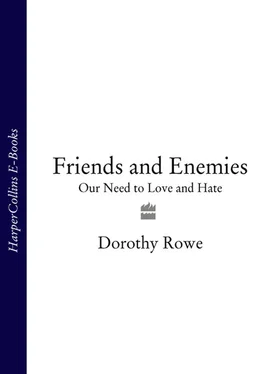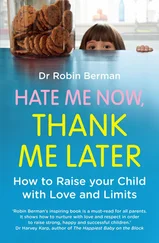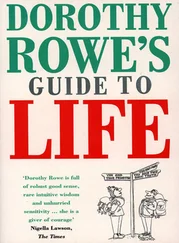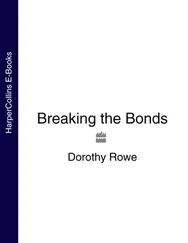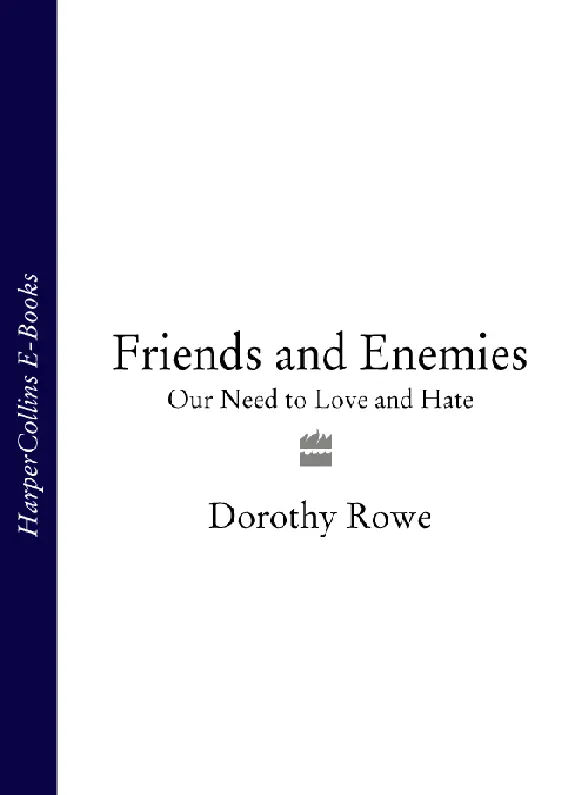
Friends and Enemies
Our Need to Love and Hate
DOROTHY ROWE

To the memory of my dear friend
Hilary Surman
Cover
Title Page
Dedication
Preface
CHAPTER 1 Friends and Enemies
CHAPTER 2 Learning to Become Ourselves
The Meanings in Our Brain
Your Meaning Structure
Forms of Thought
Others – The Necessity and the Threat
CHAPTER 3 Belonging to a Group
Defining Yourself and Your Group
Owing Allegiance to Your Group
Is Your Group Your Friend or Your Enemy?
CHAPTER 4 Belonging to a Family
Becoming Part of the Family
What Are Family Values?
Family – The Tie That Must Bind Us All?
CHAPTER 5 Belonging to a Place
Losing Your Place
You Can’t Go Home Again
CHAPTER 6 Strangers and Enemies
The Necessity of Enemies
The Leaders We Deserve
The Meaning of Violence
The Pleasures of War
CHAPTER 7 The End of Enmity
The Satisfactions and Failures of Revenge
Who’s Responsible?
Becoming Reconciled
Is Forgiveness Possible?
CHAPTER 8 The Art of Friendship
Living in a Peaceful World
Can Your Lover Be Your Friend?
The Art of Friendship
Notes
Index
Acknowledgements
About the Author
By the Same Author
Copyright
About the Publisher
Friendship is our greatest invention. No technological construction, no work of art, can compare with the art and skill of friendship which takes us out of the lonely world of our own individual perceptions and puts us close to another person, linked by feelings of love, trust, tolerance, sympathy, generosity, kindness, joy and humour. We can set ourselves the greatest tasks and achieve them, we can become rich, famous and powerful, but all our achievements will be mere dust and ashes if we are friendless. We can have lovers, we can have family, but all these relationships will bring us nothing but misery if they are not imbued with the qualities of friendship.
Friendship has always been of supreme importance in our lives, but today it has taken on a new urgency. Changes in society and in our expectations mean that many people turn to friends to supply what in past years they would have looked for in marriage or family. A businesswoman in South Africa said to me, ‘If I had to choose between my husband and my friend I’d choose my friend. She and I talk every day. We tell each other everything. My husband is all right, but we don’t talk.’
Moreover, while nations no longer engage in huge wars which mobilize many thousands of troops, across the globe we see conflicts which, though they involve smaller numbers of people, inflict terrible violence and suffering on everyone caught up in them. It is essential to resolve these conflicts if we are to overcome the ecological threats to our planet. Enmity is as old as friendship, yet we seem unable to understand why, when friendship is so glorious and so precious, many people choose to be enemies rather than friends. Of course a friendship has to be reciprocal, two people in tune with one another, while you can hate someone without that person hating you. It is even easier to be hated. You do not have to do anything. You just have to exist. You are sure to have some characteristic which someone hates – the colour of your skin, the place you were born, your sexuality, your religious beliefs.
We seem unable to understand how to turn enmity into friendship. The existence of enmity seems to be taken for granted. We deplore revenge and praise forgiveness but we rarely ask, ‘How do we learn the art and skill of friendship?’ or ‘Why is friendship so hard to achieve?’ or ‘Why, when we have been wounded by an enemy, does revenge become an imperative?’ or ‘Can we live without enemies?’ or ‘How does reconciliation become possible?’ or ‘Can we choose to forgive, and, if we can, why don’t we?’
These and other questions about friendship and enmity I examined in discussions with friends, colleagues and workshop participants, and with people I met on my travels in Serbia, Lebanon, Northern Ireland, South Africa, Vietnam and Australia. Such discussions covered both intimate personal experiences and questions arising from national, racial, political, social and religious issues. As I wrote this book conflicts raged around me. NATO bombed Serbia; the United Nations fumbled their task of protecting the people of East Timor; Russia invaded Chechnya while the West did no more than chide. The Unionists in Northern Ireland continued in their refusal to speak to members of Sinn Fein until Senator George Mitchell demonstrated the skills needed to turn enmity into friendship, but unfortunately he could not reach everyone in Northern Ireland who needed to change. For many people their enemies are more precious than their friends.
Just as I finished writing this book a dear young friend, Hilary Surman, someone I had known for twenty years, died within a few weeks of being diagnosed with cancer. Hilary and I were members of a small group of long-time friends. I find that the pain of losing her is edged around by the sweetness of the closeness of friends.
My thanks to all my friends and to all the people who talked to me about the importance of friendship and the dangers of enmity.
Dorothy Rowe
London, November 1999
‘You don’t make friends. You recognize them.’
This is what people told me, again and again. Somehow, when we meet someone for the first time, we usually know whether that person could become a friend.
For Tima in Beirut it was a matter of trust. She said, ‘They have to inspire a feeling of confidence in me, and with me it all has to do with feelings. I can be with one person once and know for sure if this person is trustworthy or not, and in the long run I am usually right about it. It’s an instinctive thing, so there’s no special criterion where I see shoe size, head size or whatever. It’s nothing like that – no measurements or anything, but inspiring a good feeling from within.’
For Jane in London it was a matter of sorting the wheat from the chaff. She said, ‘When I meet someone for the first time I know, instinctively almost, whether a person meets my criteria for becoming a friend. If they don’t I don’t let them through.’
Yet finding a friend is not like finding a diamond which you can put in your pocket and keep. The person you see as having the potential to be a friend has to see you as having the same potential. Only then will the friendship develop. You might like the other person so much that, even though you receive no encouragement, you continue to see the other person as a friend; if, however, the person does not return your feeling, opportunities for you to be together as friends are not created. You might continue to meet at work or in the course of some mutual interest, but invitations to lunch or for you to meet the family do not materialize. You might continue to feel warmly towards the person, but, as time goes by, with no encouragement your warm feelings soon dwindle and fade into what is really the opposite of friendship – a kind of vague interest which shows itself only when an opportunity to gossip about the person arises. You know that the person who did not become a friend feels the same about you because, when you meet, you each go through friend-like rituals, but the spark for friendship is not there.
Читать дальше
